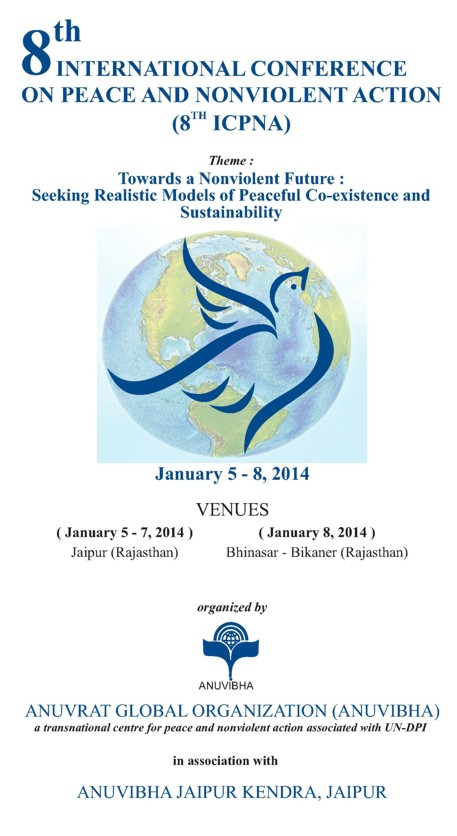 | 8th International Conference on Peace and Nonviolent Action |
January 2014, Jaipur.
We were participating in an international conference on Nonviolence, organized by the Jain Anuvrat movement. There were about 125 participants from all over the world, sharing their vision on how the world can become more nonviolent. Our conclusion was that it has to come from individual man. It has to come from a choice within.
Daily walking the 200 yards from our comfortable conference space to our comfortable hotel, the reality of Indian pavements struck us in the face. Numerous of poor people - parents like you and us, children, like ours and yours, elderly people like your and our parents. People who never have had a chance and whose children most likely will never get chance in life.
Facts, lectured in the conference: India’s economy has grown strongly 9 years on a row. It made the rich people significantly more rich. The middle class grew and rose. However, the poor people did not profit from this. They got poorer. The gap between the people that have money and opportunities in society and those who do not have money and opportunities grew bigger. Can this be changed?
Fact: India does know a minimum wage. It differs per state and per profession. The lower end of the minimum wage is very minimum indeed. So there is some protection for the poorest by the government. The problem is that this minimum of minimum very often is not been paid. The second problem is that minimum of minimum wages seem so low, that one has to wonder if this is to be considered a realistic minimum wage.
How can this be changed? Many organizations and individual people help by creating vocational trainings and many other projects. We are truly grateful for all this sincere care for the people at the lower end of society. Does it help? Sure, it will help a number of people, and that’s great! But let’s assume 10% of all the poor people are being helped this way. How about the 90% that is not being helped? We cannot solve the problem by vocational trainings and the like only, because we do not address the core issue this way. The core issue is that we accept that the bottom layer of society gets paid so little, that they hardly can live of it. So the answer to this problem is simple: let’s pay people who work for us a wage that is sufficient for them to take care for themselves and for the people they care for. We think the Jain people of India have got all that it takes to bring a change about. Let us explain this.
Underpaying
Everybody needs a roof over his head; every-body has a stomach that needs to be filled; everybody needs to be able to wash himself; dress himself. Most of the people who earn money do not only have to provide for themselves, but also for their family. So on top of shelter, food, sanitary and clothes, they also have to provide for the children the opportunity to be educated. If a man has worked a day, a week, a month and the salary he gets is not enough to provide for these very basic standards, then this family will suffer. We call this underpaying.
Ahimsa
Under-paying causes suffering. Therefore it can be defined as a form of himsa, violence. So, underpaying is a kind of violence. Actually, if you really look at the conditions the poor people in India live in, could we then not say that this is even a serious act of violence? It is a kind of violence that is widely accepted in the whole world. And yet, it creates massive suffering.
This is where the Jains come in. Jainism is centered around the concept of non-violence, ahimsa. For thousands of years non-violence is the heart of Jainisme. Jains have worked this concept out for many aspects of life - more than any other tradition ever did! Does stopping the violence of underpaying not fit 100% in the finest of Jain tradition? Is stopping underpaying in Jain philosophy not the way to liberate the soul as it is an act of non-violence? So Jains could take the lead here, because their tradition tells them to stop violence. Is this not a huge opportunity for Jains to contribute to the development of India?
Compassion liberates the soul
Spiritual traditions are about liberating the soul. All traditions teach that compassion liberates the soul and that indifference towards suffering binds the soul. Underpaying is indifference towards the suffering of the chanceless people. Choosing to pay a sufficient and fair minimum wage is an act of compassion and therefore helps to liberate the soul of the giver as well as the receiver.
Stopping underpaying can be an individual choice
Once we realize underpaying is a serious act of violence, we can decide to start to pay every person who works for us a realistic minimum wage - or more of course. This can be our own decision. We do not have to wait for the government to make better rules, or check payments better or for corruption to stop. We even do not have to wait for our neighbors to be the first to stop underpaying. We also do not have to wait for permission from anybody in the whole world to pay a realistic minimum wage. We are free to choose this very moment to stop underpaying as an act of moral responsibility and compassion.
(Fair) miminum wage
What would be reasonable to pay as a fair minimum wage? Obviously the lowest minimum wage to be paid is the minimum wage as defined by law. But these minimum wages are political compromises that sometimes seem very low indeed. So we would like to introduce the concept of fair minimum wage. Where the minimum wage as defined by government is an objective - fixed - measure, we would like to define a fair minimum wage fully subjective. You pay what you consider fair, as long as it is minimally as much as the minimum wage as defined by law. Fair goes for both sides: the man who is working and the man who is paying. Fair means that the one who pays honestly decides what he considers a fair wage in a given situation. For example: it seems fair that a 17 year old boy earns less than a 30 year old person. But what if this 17 year old boy is working very well and is the only provider for his family? It might be fair to give him more. And what about the woman that is doing her job very well: is it fair to pay her less than a man of the same age who is doing the same job? As far as the man who is paying concerned, for some people is it easy to pay more, for others impossible. I would suggest that a fair minimum wage is fair for the worker and fair for the one who pays.
The 12th Anuvrat
Stopping underpaying can be an individual decision; a code of behavior a person promises himself; a vow. This can be a total personal vow that nobody knows about. It then is your own inner vow: beautiful! Jains know that vows can be very powerful in helping a person stick to his good intentions. Acharya Tulsi created the principle of anuvrat for laypeople. An anuvrat is a so called small vow. Anuvrats are rules for morally sound behavior. There are 11 anuvrat’s, all supporting people to live a non-violent life. How would it be if a 12th anuvrat is being installed? This 12th anuvrat would be the vow to never ever in your future life underpay any person who is working for you. Or, positively formulated to minimally pay every person who in your future life will work for you a fair minimum wage. We humbly invite the current Acharya of the Jains, Shri Mahashraman, and the Head of Anuvibha, to look into this idea, to look at this great opportunity for individual Jains and for the Jain people to stop this serious violence against the poorest and this great opportunity for Jain people to liberate their own souls. We suggest that this 12th anuvrat will be a separate anuvrat, that can be taken separately from the 11 other anuvrats, hoping to reach this way a maximum number of people.
The Jains are the most wealthy group in India
Another fact we learned at the Jain conference on non-violence: the relatively very small Jain community (0,4 % of the total Indian population) carry yearly 24% of the Indian economy. So the Jains as a group are extremely wealthy. This might mean that for many Jains it is very easy to stop underpaying: there is plenty of money. For many other Jains it is perhaps not very easy to stop underpaying, but still they can do it, because there is enough. This could be seen as another reason why the Jains as a group got what it needs to stop underpaying.
Your money is worth more than you might realize
Let’s say you were used to pay 180 rupees for a hard day’s work. Let’s assume that you yesterday took the vow to stop underpaying. Today you pay this person 400 rupees. This man now can take better care for his family. So he most likely will spend this very day most of the money - he is poor and has no reserves and needs the money for the most basic necessities. Obviously he will not spend his money in a posh restaurant or boutique. No, he spends his money there where it is cheapest: at the street buying from other people who also have very little income. So these poor people get more money. Your 400 rupees now starts to work for several other families. And of course, these families will spend the profit very soon, giving the profit to other families. Another group of families gets some extra money. Within a month your 400 rupees have gone through the hands of many families, filling many bellies. These people are so poor, that they all spend the money they get almost the day they get it. Therefore your 400 rupees run with an enormous speed through the very low income class, helping them all to make their lives a little better.
What if 100.000 Jains take the 12th vow?
We have seen that the 400 rupees for one day work create a little wave through the lowest income class. What would happen if many Jains join in? What if the really rich Jain join in, those who have big factories with many, many employees? Then a huge group of the poorest people would be raised out of the deepest poverty. This group would start spending their raised income among their fellow poor people. So they in there turn, would raise numerous other people out of the deepest poverty. This is our dream. And it seems like the Jains can do it, because they have all that it takes: a long tradition of nonviolence; the principle of anuvrats to improve their way of living; leaders who encourage them to be nonviolent and, as a group, more money than any other group in India. How great would this be!
 Dr. Alphonse Fons Delnooz
Dr. Alphonse Fons Delnooz
 Patricia Cecilia Martinot
Patricia Cecilia Martinot